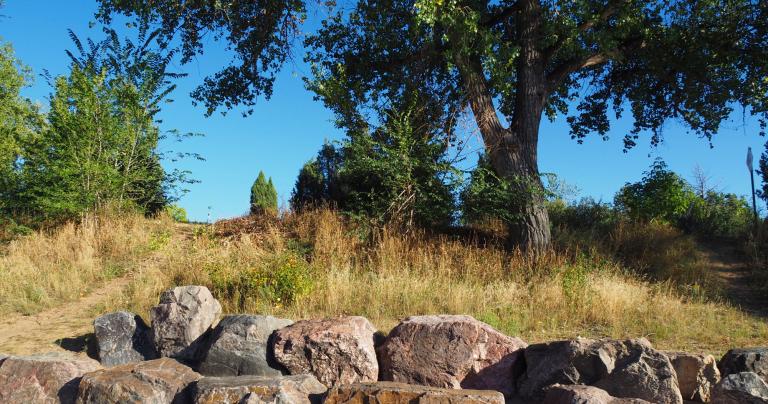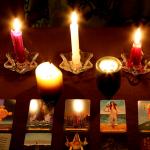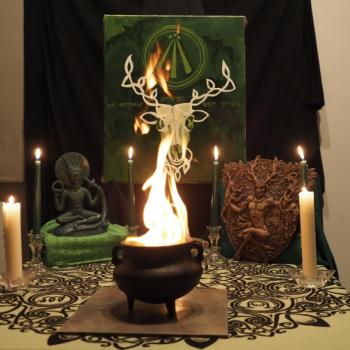Recently someone asked me to write a post on “what beginners need to be aware of before joining.” I’m going to write that post sometime soon, but I think I need to write this one first. Mainly this is because most of the regular readers of this blog aren’t exactly beginners, but also because the question had a 1990s BBS “shut up and read the FAQ, noob” air to it.
Rather than telling newcomers how to behave, I think we’d be better off concentrating on what we can do to be honorable and welcoming hosts.
I do not use the word “owe” lightly. Hospitality is among the greatest of Pagan virtues, and it means more than offering food and drink. People come to us looking for a community where they can learn sacred traditions and explore the deepest questions of life. What will they find when they arrive?
Here are seven things we owe newcomers to Paganism.
1. A warm welcome
This is the most basic form of hospitality there is. Someone we’ve never seen before walks into one of our open circles – what do we do? If we’re like too many Pagan groups, we never notice them because we’re hidden away in the kitchen talking to our friends. That doesn’t make a very good first impression.
In 2015 I wrote Hospitality For Humans, which talks about how we can do a good job of welcoming our guests. Say hello. Introduce yourself. Ask questions and let people tell you about themselves. Tell people what they need to know to fully participate in the ritual. Accommodate special needs. And thank them for coming.
It takes courage to walk into an unfamiliar religious ceremony run by unfamiliar people. Respect the courage of your guests, and greet them warmly.
2. An environment safe from predators
What am I talking about? Go read So Long and Thanks for All the Abuse: A History of Sexual Trauma in the Pagan Community by Sarah Anne Lawless. It’s long – read it all. Read the comments too. Pay particular attention to “The Respected Elder” who was so clueless he didn’t realize he was being called out. It’s painful to read. Read it anyway.
Here’s a key quote:
Predators, pedophiles, molesters, rapists… we like to think they are not in our community. We like to think our bond of sharing the same spirituality nullifies their presence and that a spiritual person could never do harm. Time and time again, we are proven wrong.
It’s easy to point fingers at Catholic priests who molest children and rich young men who rape and get away with it. It’s much harder to deal with inappropriate touching, pressure to have sex, and outright assault in our own groups, when we have to either do the investigative work ourselves or turn it over to the police.
It’s also necessary.
Newcomers deserve an environment safe from predators – and so do long-term members.
3. Respectful boundaries
I still occasionally come across Pagans who say that Paganism is all about doing whatever you want, with no boundaries. But even Thelema moderates “do what thou wilt shall be the whole of the law” with “love is the law, love under will.”
We need not develop our own Ten (or whatever number) Commandments. But any religion or group needs boundaries – it is the lack of clear boundaries that makes it so easy for predators to operate in our groups and gatherings.
Does your group have a statement on inclusivity and non-discrimination? Does it have a code of conduct that spells out what behaviors are not acceptable? Are these boundaries well-known? Are they enforced, gently where possible and firmly where not?
Beyond organizational policies, we also need respectful boundaries around our individual relationships. People’s personal lives are their own business – respect them.
In addition to boundaries of conduct, we need respectful religious boundaries. There is an attitude in our wider society of “deep down it’s all the same.” No. Our different religions have different foundational assumptions, different traditions, different goals, and different approaches. It’s not all the same, but that’s OK.
We owe newcomers a clear explanation of who and what we are, and just as importantly, who and what we aren’t.
4. Honest history
People still occasionally come into Paganism with the idea that we’re doing exactly what our pre-Christian ancestors did, or that nine million witches were killed during the Burning Times. We owe them an honest assessment of our heritage. Besides, the real history is interesting enough, and simply being old doesn’t mean a religion is meaningful and helpful.
We also owe newcomers an honest history of our individual groups and traditions. It’s fair to say that modern Druidry is 300 years old. But OBOD was founded in 1964 and ADF in 1983.
Sometimes the problem isn’t that we claim stuff is older than it is. Sometimes Pagans claim a tradition is a brand new thing when in reality it’s an offshoot of an existing tradition with a couple of tweaks. My own standard liturgy draws heavily from ADF’s Core Order of Ritual, with influences from OBOD and the Western Mystery Tradition, with a couple of elements that as far as I know are unique to our Denton tradition. Credit your sources, whether they’re old or new.
5. Clear expectations
What are your group’s requirements for membership? What are the requirements for initiation? Is the initiation a simple matter or is it an ordeal? What commitments are members expected to make and keep: personal practice, group practice, finances, anything else?
Mysteries must be guarded and sacred traditions preserved. But no one should have to make a major religious decision or commitment without plenty of time to consider if they really want to do it.
There is no one right way to structure a group or a tradition. Some have loose membership requirements and some have rather extreme demands. Every group isn’t intended for everyone, and traditions with high barriers to entry tend to be more resilient than open groups. But whatever the approach, we owe newcomers a clear presentation of our expectations.
6. Loving support
A religious tradition – especially a local group – is more than a collection of individual practitioners. It’s also a family – and families look out for each other.
We owe our newcomers the kind of support we give our friends and families. Perhaps Evangelicals can be forgiven for not caring about the people they don’t know in their 5000 member megachurch, but if a member of a 13-person coven or a 40-member grove has mundane needs, we owe them whatever assistance is wanted that we can provide.
The principles of hospitality and reciprocity apply. I’ve seen people who come into a group and immediately start making all kinds of demands. We don’t owe those people anything. But let’s take care of our own.
We also owe newcomers our support as they try to learn and figure out things for themselves. They will have questions. Sometimes we need to tell them the answer. Sometimes we need to tell them where to find the answer, or point them in the direction of the answer. Other times we have to say “I don’t know – what do you think?” Not always because they need to work through it themselves (though sometimes that’s the case), but because sometimes we genuinely don’t know and we need to be honest about it.
7. An unlocked door
We love it when people come to our public gatherings, when they want to join our groups, and when they start wanting to actually be Pagans. We don’t like it so much when they decide to leave.
But if people come to the conclusion that this isn’t really for them, integrity demands that they move on. We have no right to stand in their way.
If they’ve taken oaths there may be repercussions from abandoning them, but those repercussions are in the realm of the Gods. It is not our place to enforce them. Which is not to say that if someone abandons us and later wants to return we have to take them back. Maybe we do, maybe we don’t.
But if someone wants to leave our groups, our traditions, or our religions, our only proper response is to hold the door open for them and wish them well on their spiritual journey.




















